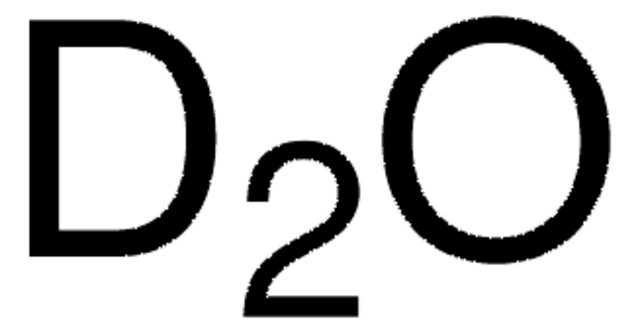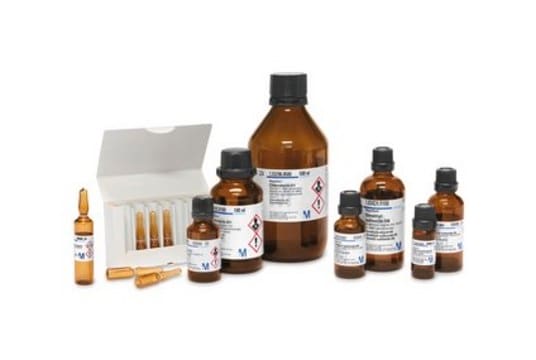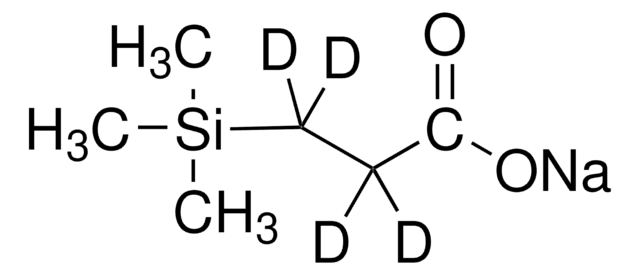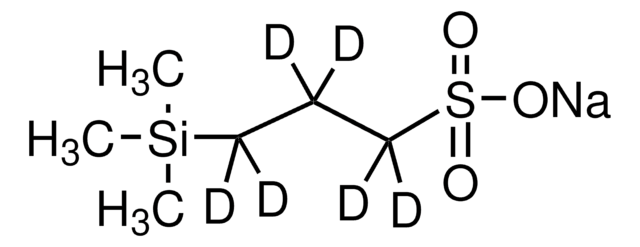343773
Deuterium oxide
99.9 atom % D, contains 1 % (w/w) 3-(trimethylsilyl)-1-propanesulfonic acid, sodium salt (DSS)
Synonym(s):
Heavy water, Water-d2
Sign Into View Organizational & Contract Pricing
All Photos(2)
About This Item
Empirical Formula (Hill Notation):
D2O
CAS Number:
Molecular Weight:
20.03
EC Number:
MDL number:
UNSPSC Code:
12142201
PubChem Substance ID:
NACRES:
NA.21
Recommended Products
isotopic purity
99.9 atom % D
Quality Level
form
liquid
contains
1 % (w/w) 3-(trimethylsilyl)-1-propanesulfonic acid, sodium salt (DSS)
technique(s)
NMR: suitable
bp
101.4 °C (lit.)
mp
3.8 °C (lit.)
SMILES string
[2H]O[2H]
InChI
1S/H2O/h1H2/i/hD2
InChI key
XLYOFNOQVPJJNP-ZSJDYOACSA-N
Looking for similar products? Visit Product Comparison Guide
Application
Deuterium oxide can serve as a solvent in the :
- NMR analysis.
- 1HDOSY (Diffusion-Ordered Spectroscopy) NMR experiments.
Recommended products
Check out ChemisTwin®, our brand new online portal for identity confirmation and quantification of NMR spectra. Learn more or reach out to us for a free trial.
Storage Class Code
10 - Combustible liquids
WGK
WGK 3
Flash Point(F)
Not applicable
Flash Point(C)
Not applicable
Choose from one of the most recent versions:
Already Own This Product?
Find documentation for the products that you have recently purchased in the Document Library.
Customers Also Viewed
Structure of water and hydrophobic bonding in proteins. IV. The thermodynamic properties of liquid deuterium oxide.
Nemethy G and Scheraga HA.
J. Chem. Phys. , 41(3), 680-689 (1964)
The ionization constant of deuterium oxide from 5 to 50?.
Covington AK, et al.
The Journal of Physical Chemistry, 70(12), 3820-3824 (1966)
Sandra J Veen et al.
Physical review letters, 109(24), 248302-248302 (2013-02-02)
By using the critical Casimir force, we study the attractive strength dependent aggregation of colloids with and without gravity by means of near field scattering. Significant differences were seen between microgravity and ground experiments, both in the structure of the
Using high-performance quantitative NMR (HP-qNMR?) for certifying traceable and highly accurate purity values of organic reference materials with uncertainties< 0.1%.
Weber M, et al.
Accreditation and Quality Assurance, 18(2), 91-98 (2013)
Takhar Kasumov et al.
American journal of physiology. Heart and circulatory physiology, 304(9), H1201-H1214 (2013-03-05)
Traditional proteomics provides static assessment of protein content, but not synthetic rates. Recently, proteome dynamics with heavy water ((2)H2O) was introduced, where (2)H labels amino acids that are incorporated into proteins, and the synthesis rate of individual proteins is calculated
Our team of scientists has experience in all areas of research including Life Science, Material Science, Chemical Synthesis, Chromatography, Analytical and many others.
Contact Technical Service






